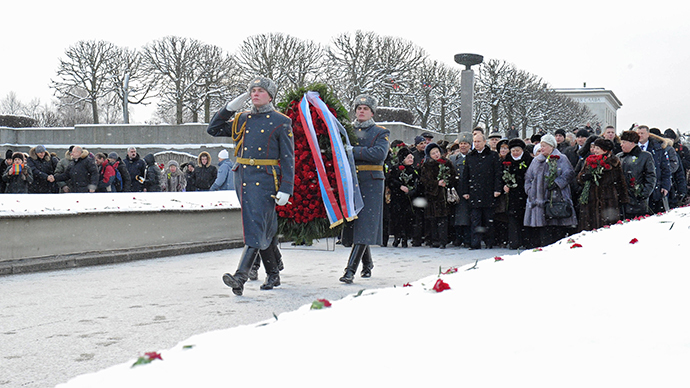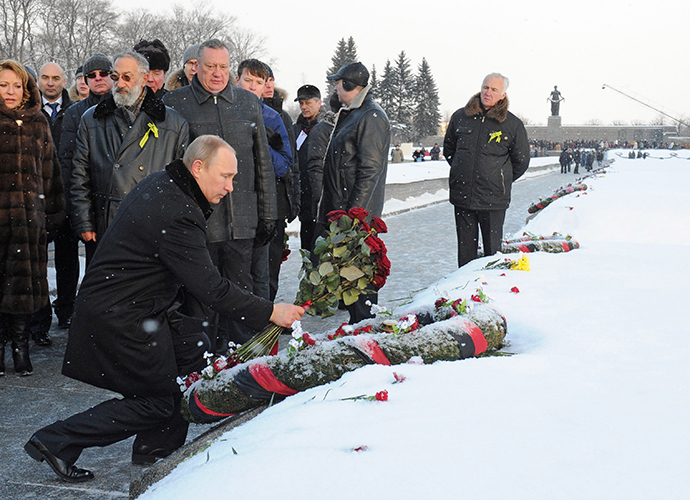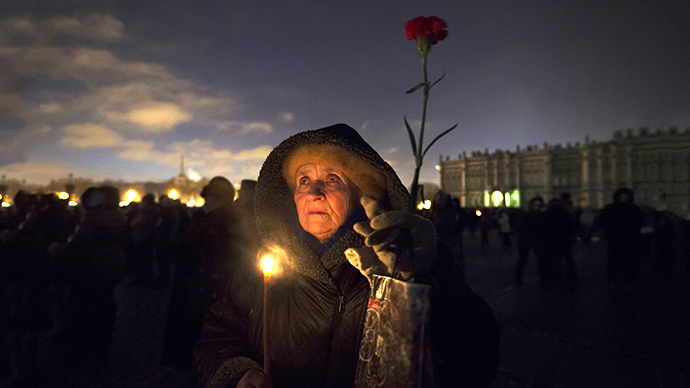Russia has marked 70 years since the end of the Nazi's Siege of Leningrad, which claimed the lives of more than one million people. Germany's president has expressed “deep sadness and shame” at the 872-day assault that took place during World War II.
The survivors of the dramatic events retell the unimaginable suffering they had to go through in RT’s documentary. Also watch galleries of photographs taken in besieged Leningrad during the war and of the reenactment of the epic battle that broke the blockade of the city more than two years after it was encircled by Nazi troops.
A number of commemorating events took place across Russia in
honor of the bravery and endless human sacrifice shown during the
Nazi siege.
In St. Petersburg, some 1,500 people took part in a military
parade showcasing Soviet-era wartime T-34 tanks, as well as
modern Iskander ballistic missiles. Veterans and survivors of the
siege watched the military procession in tears. Some attended
from other cities from across Russia.
Despite the frost, nearly 2,000 young men and women built a human
chain in front of the Winter Palace, creating a formation which
said "900."
In the run-up to the anniversary, local authorities assembled an
exhibition reconstructing part of a street in the city center
with siege-related artifacts such as sandbags, boarded-up
windows, theater bills, and old cars and trolleybuses.

A 3D panoramic view of the “breakthrough battle” of the Great
Patriotic War of 1941-1945 was also created by a youth search
team, thanks to a Russian presidential grant in the city of
Kirovsk in the Leningrad Region.
Russian President Vladimir Putin - a Leningrad native whose
mother survived the horrors of the blockade and whose elder
brother perished because of hunger - took part in all of the St.
Petersburg events on Monday.
Putin laid a wreath at the Motherland monument in Piskaryovskoe
Memorial Cemetery, the main resting place for victims of the
siege.

Surrounded by survivors of the blockade, Putin reminded that the
world should never forget “the courage and heroism of the Soviet
people and residents of Leningrad.”
He added that “360,000 civilians died in Leningrad over a
period of just four months from the end of 1941 to the start of
1942. Britain lost nearly the same amount in the entire World War
II.”
“Can you imagine the difference between the victims that the
Soviet Union and other countries of the world laid on the altar
of common victory?”
The celebrations in St. Petersburg concluded with a performance
of the Requiem ballet at the Alexandrinsky Theater, which was
dedicated to the city’s liberation. A military salute
commemorated those who lost their lives liberating Russia’s
second city.
This year, Germany’s lower house of parliament dedicated its
memorial day to the victims of Nazi Germany to the people of
Leningrad.
“Germany recognizes its historical responsibility for the
suffering inflicted on the people of Leningrad and for the brutal
warfare of its soldiers, commandos and SS formations,”
German President Joachim Gauck wrote in a letter to Putin.
Daniil Granin – a 95-year-old war veteran, siege survivor, and acclaimed writer – was invited to the Bundestag to recall the horrific memories of his experience during the blockade. German President Gauck and Chancellor Angela Merkel also listened to his speech. Granin was only 22 years old when he joined the fight to protect Leningrad.
“Hunger was brought to the city to wage war, instead of soldiers,” Granin told the chamber in Russian through an interpreter. The German politicians were silent as the war veteran described the cases of cannibalism he witnessed.
“We had to load the corpses that were so emaciated they were as light as firewood onto wagons. For a long time I could not forgive the Germans,” he said.
US Ambassador to Russia Michael McFaul also recognized the Soviet people’s sacrifice, saying that more Americans must know about Russian valor and the Leningrad blockade.
“Not only the people of Russia, but also the people of the whole world owe a lot to those who stopped and drove away the Nazis. Without your victory in Leningrad and other battles of WWII, world history could have taken a totally different path,” McFaul said.

